Croatian Catholic Bishops Deplore Russian Aggression Against Ukraine
ZAGREB, 20 April 2022 - The Iustitia et Pax (Justice and Peace) Commission of the Croatian Catholic Bishops' Conference on Wednesday condemned the Russian aggression against Ukraine and against European values in general, expressing Christian solidarity with Ukraine.
The Russian Federation's all-out attacks against Ukraine amount to the crime of aggression against an independent, sovereign and democratic state, against the fundamental European values and the democratic right of a country to self-determination and against the fundamental Christian values of justice and peace, reads the Commission's statement.
Presenting the document, the Commission's secretary Vladimir Dugalić and member Stjepan Baloban said that the brave resistance of Ukrainian defenders has become the struggle for Europe's freedom and democracy.
The two priests expressed hope that the "Calvary of the Ukrainian nation will result in the resurrection of peace and freedom."
They conveyed their Christian closeness and solidarity with the Ukrainian people and ethnic Ukrainians in Croatia.
The Commission supports the efforts of the democratic world to offer assistance in the form of shipments of military equipment and weaponry to Ukrainian defenders in their just cause.
The assistance must remain within the framework of proportionality and international humanitarian law so as to keep the conflict under control and prevent it from escalating into a world war, the two priests said.
The Commission says that a difficult task lies ahead for politicians to strike a balance between solidarity and necessary military self-constraint against a backdrop of threats of the use of nuclear weapons which can be disastrous for the entire humankind.
The priests warned that the diplomatic efforts have not attained their goals, warning that the consequences of the war would certainly be felt in the long run.
Dugalić and Balaban said that the Russian aggression cannot be justified by "higher metaphysical" objectives, adding that it is encouraging to see that more and more Russian citizens are expressing their disapproval of the current policy, despite mass repression.
It would be wrong to blame the whole Russian people for the present situation while the responsibility lies with the political regime and a group of citizens and certain Russian Orthodox dignitaries who support the regime, the priests said.
They called on other religious communities to join the Catholic Church in the condemnation of war destruction and mass killings and to accept Ukrainian refugees.
For more, check out our lifestyle section.
Bogojavljenje (Epiphany) - Three Kings Day in Croatia
January 6, 2022 – Thursday 6 January is Bogojavljenje (Epiphany). Three Kings Day in Croatia is a national holiday. It is also a day marked by its own historic and very distinct traditions.
With the fireworks of New Year's Eve almost one week behind us, Christmas already feels like it was quite a while ago. But, with church bells ringing out across the land, Three Kings Day arrives on 6 January to remind us in Croatia that we're not quite finished yet.
Commonly known as Bogojavljenje (Epiphany), Three Kings Day is highly significant in the Catholic calendar. It is also a day of limited but extremely distinct tradition in Croatia. Understanding these traditions requires a comprehension of some Bible scriptures. More so, perhaps, than the traditions of any other feast or celebration days connected to Christmas.
What is Bogojavljenje (Epiphany) - Three Kings Day in Croatia?
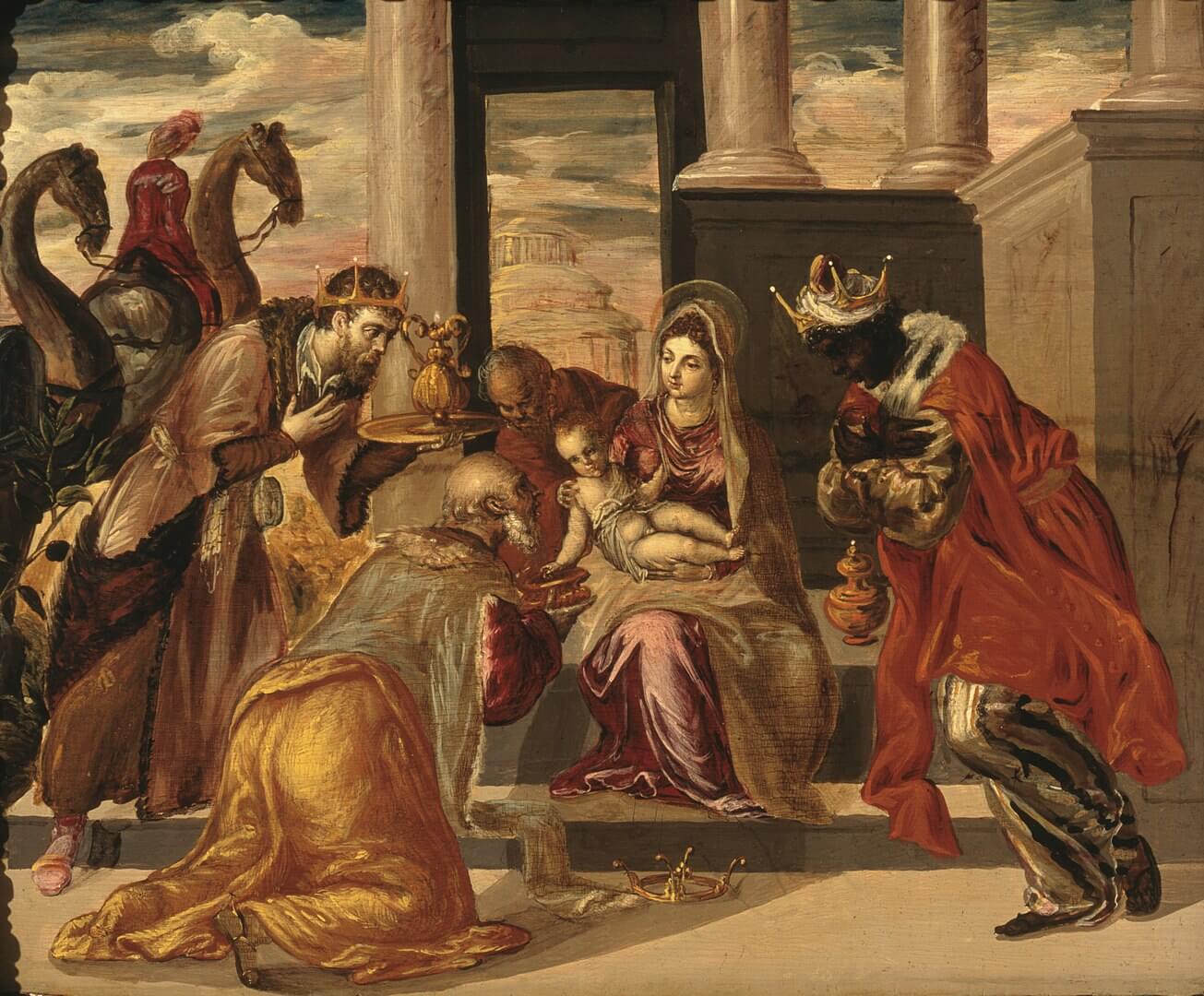 Adoration of the Magi by El Greco
Adoration of the Magi by El Greco
January 6 is celebrated in the Catholic church as both Epiphany and the day of the Three Kings. Epiphany is the revelation of Jesus as the Son of God to those outside Judaism. Three Kings Day is when the three kings – otherwise known as Magi or the three wise men - visit the newly-born Jesus and present gifts to him.
These could look like two different celebrations that just happen on the same day. But, in fact, they are not at all separate. Although, their connection does take some explaining. And the traditions the day creates in Croatia takes even more explaining.
Who are the Three Kings aka the Three Magi?
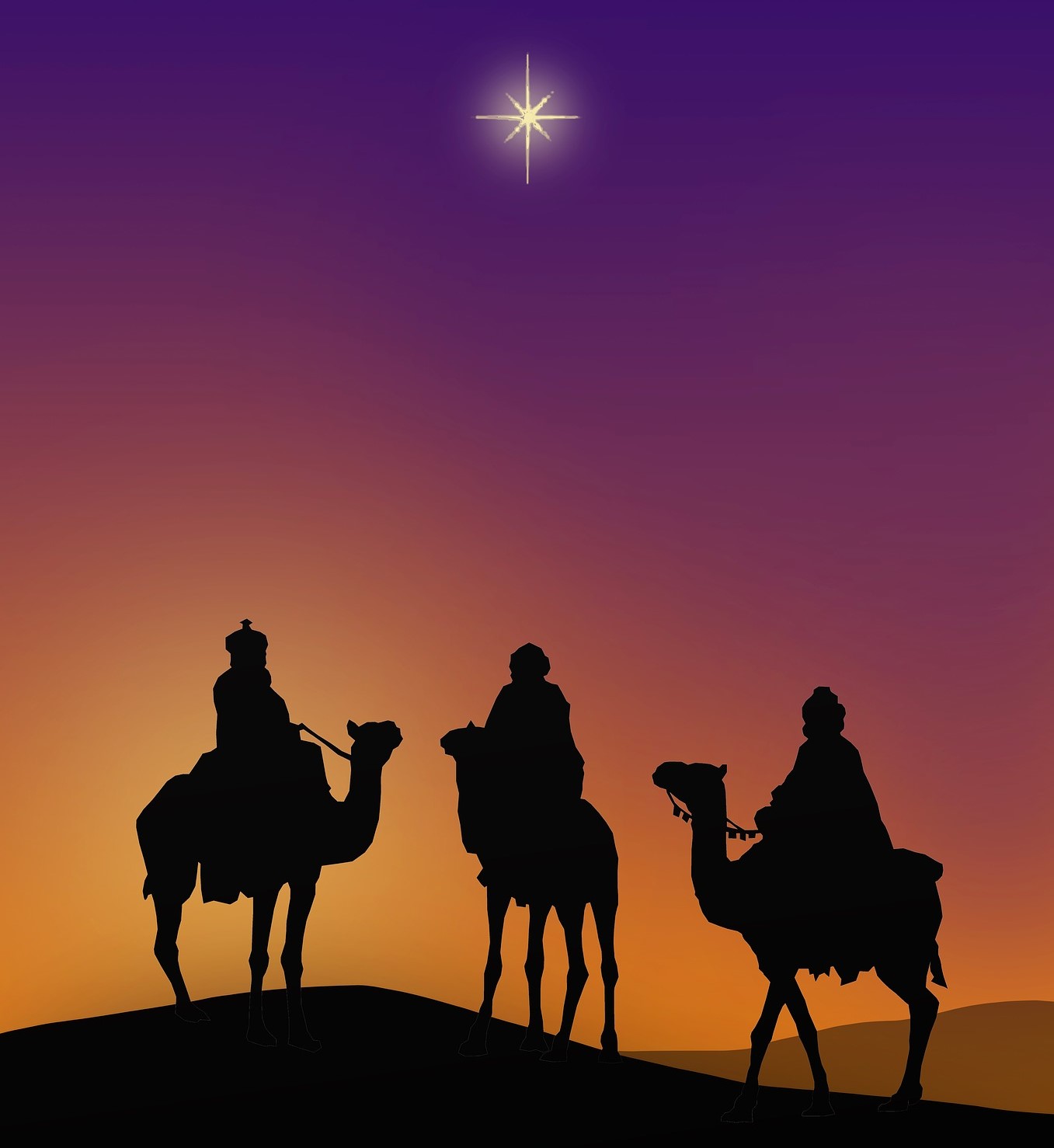 The Magi, celebrated on Three Kings Day in Croatia
The Magi, celebrated on Three Kings Day in Croatia
If you've seen a nativity scene or any Christian art related to Christmas, you'll be familiar with the image of the Three Kings. But, actually, they are not in the Bible. What the Bible says is, Magi arrive in Jerusalem at the time of Jesus's birth. They ask the location of the 'king of the Jews' so they can pay tribute. No number is allocated to the Magi.
However, the Bible details that the Magi carry with them three gifts for Jesus – frankincense, gold and myrrh. It is from this number of gifts that the embellished western tradition presumes the number of Magi. In the eastern church, the number of Magi is actually set at 12!
Their number is not the only way their story has been enhanced. Over the years, the Magi have been given very different places of origin. In some of the first embellishments, the kings are said to represent lands of Arabia, Persia and India. But, as Christianity spread, the story changed – perhaps to be either more inclusive or reflect self-importance. Later versions have the kings representing Asia, Africa and Europe. The Bible actually says all three arrive from the east (Africa and Europe are obviously not east of Judea.)
From the 8th century we find the first evidence of the Three Kings being given names - Balthasar, Melchior, and Gaspar (or Casper). In the Bible, the Magi follow a star to reach Jerusalem at the time of Jesus birth. But, they stop and ask directions. Three Kings Day is when they finally arrive to pay tribute to Jesus.
In our celebration of Christmas, this is 12 days after the birth of Jesus Christ. And yet, in every nativity and Christmas painting, shepherds attend the scene immediately after Jesus's birth, closely followed by the Three Kings. To understand what is happening with the Three Kings and the Epiphany you need to look at the Gospel according to Matthew.
Understanding the Gospel according to Matthew
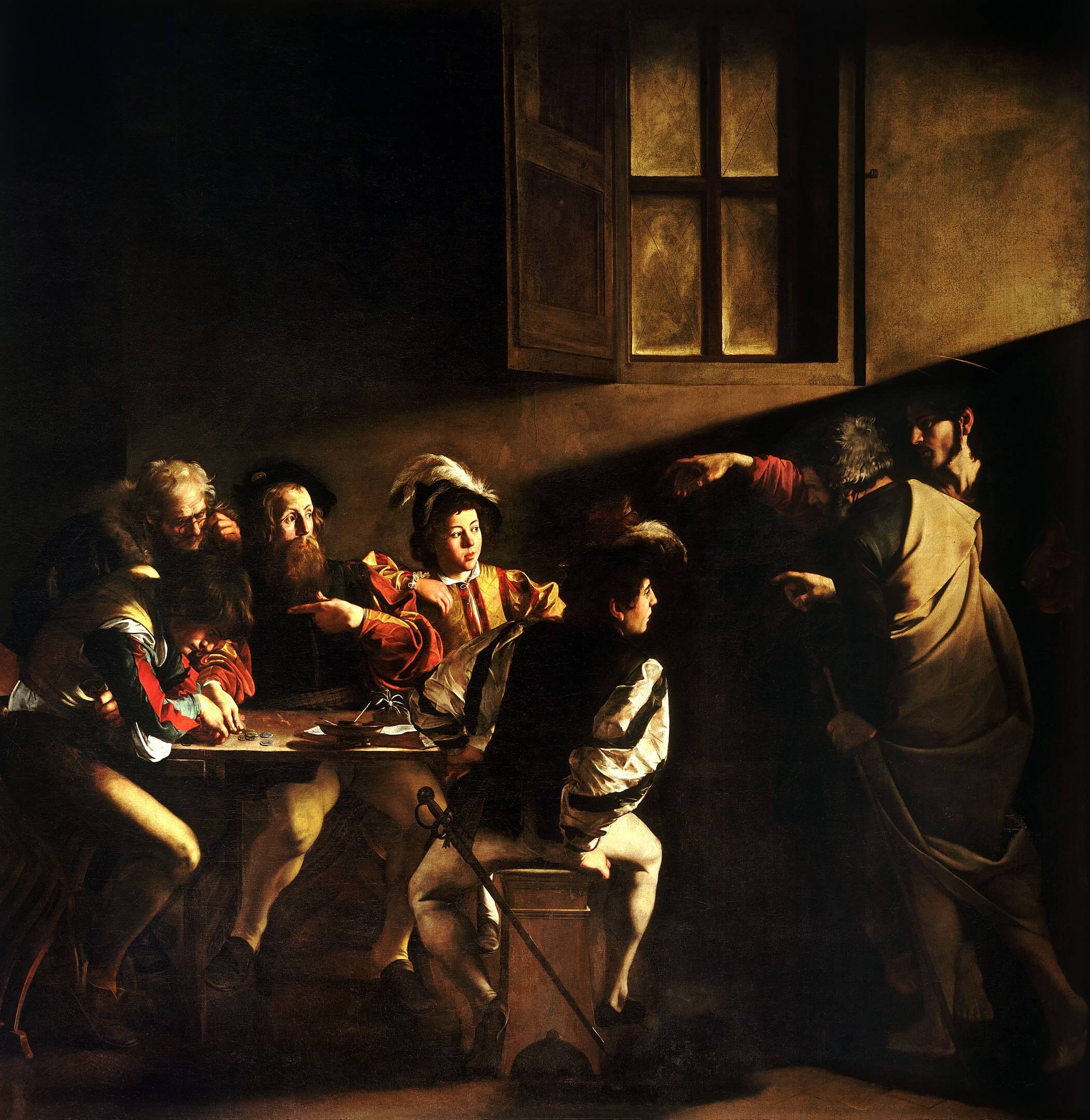 The Calling of St Matthew by Caravaggio
The Calling of St Matthew by Caravaggio
The first three books of the New Testament are Matthew, Mark and Luke. When originally written, they were not intended to be placed next to each other in a single compiled 'book'. And so, within the first three books of the New Testament, we find quite a lot of repetition, as each of these disciples recounts the life and story of Jesus.
The Gospel according to Matthew is arguably the most famous and most detailed of these books. As an example, it is the only book where we are told about the Magi visiting Jerusalem and Jesus. It is also the most Jewish of the Gospels - in structure and in language (it is originally written in Greek).
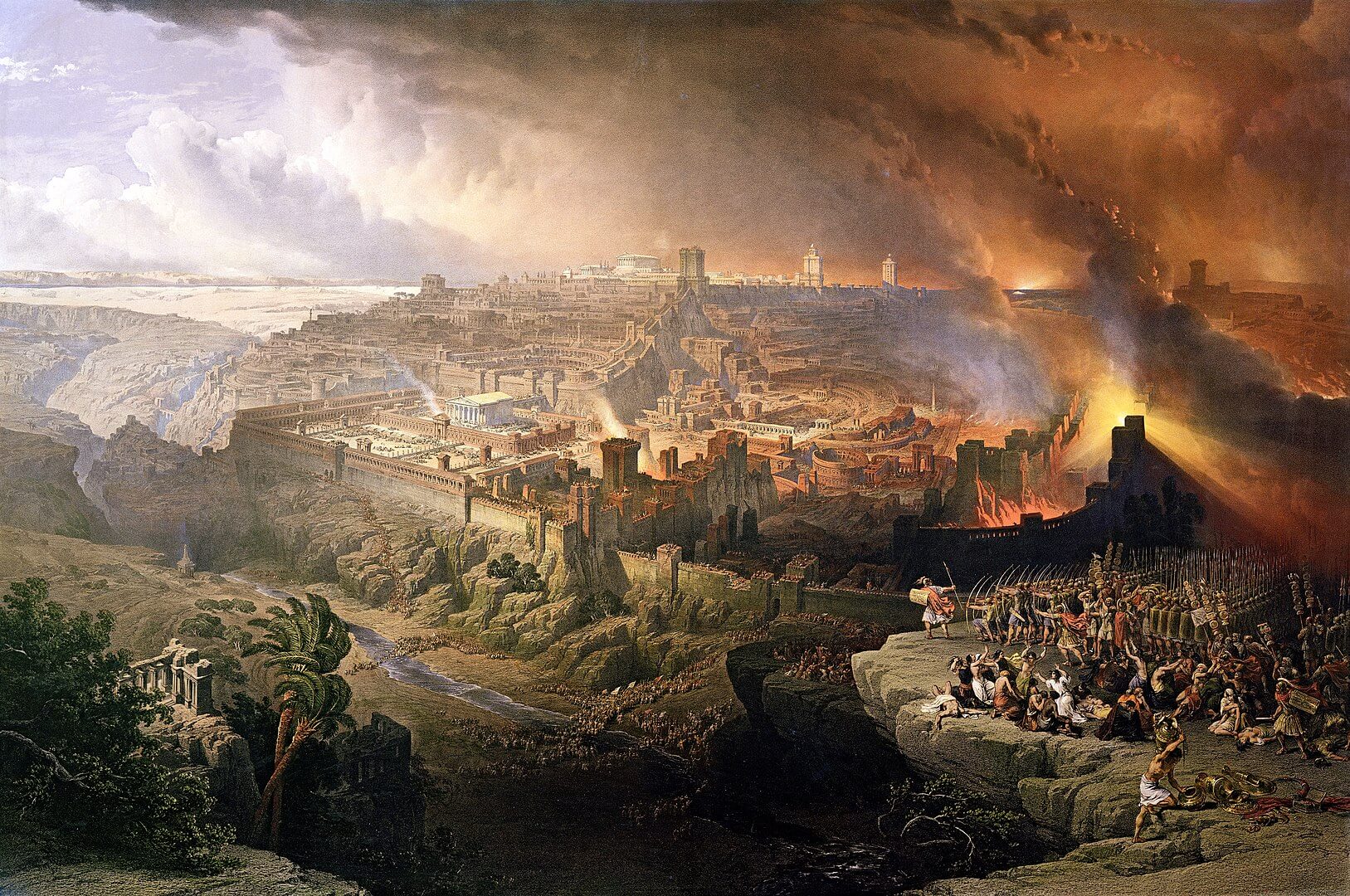 The Siege and Destruction of Jerusalem by the Romans Under the Command of Titus, by David Roberts
The Siege and Destruction of Jerusalem by the Romans Under the Command of Titus, by David Roberts
The books of both Luke and Matthew take from the book of Mark, which is widely considered to have been written first. Most scholars today agree that Matthew was written sometime between AD70 and AD100, not by Matthew himself, but by his followers. If accurately dated, the book is written within recent memory of the destruction of Jerusalem and its Jewish temple by the Romans in AD70.
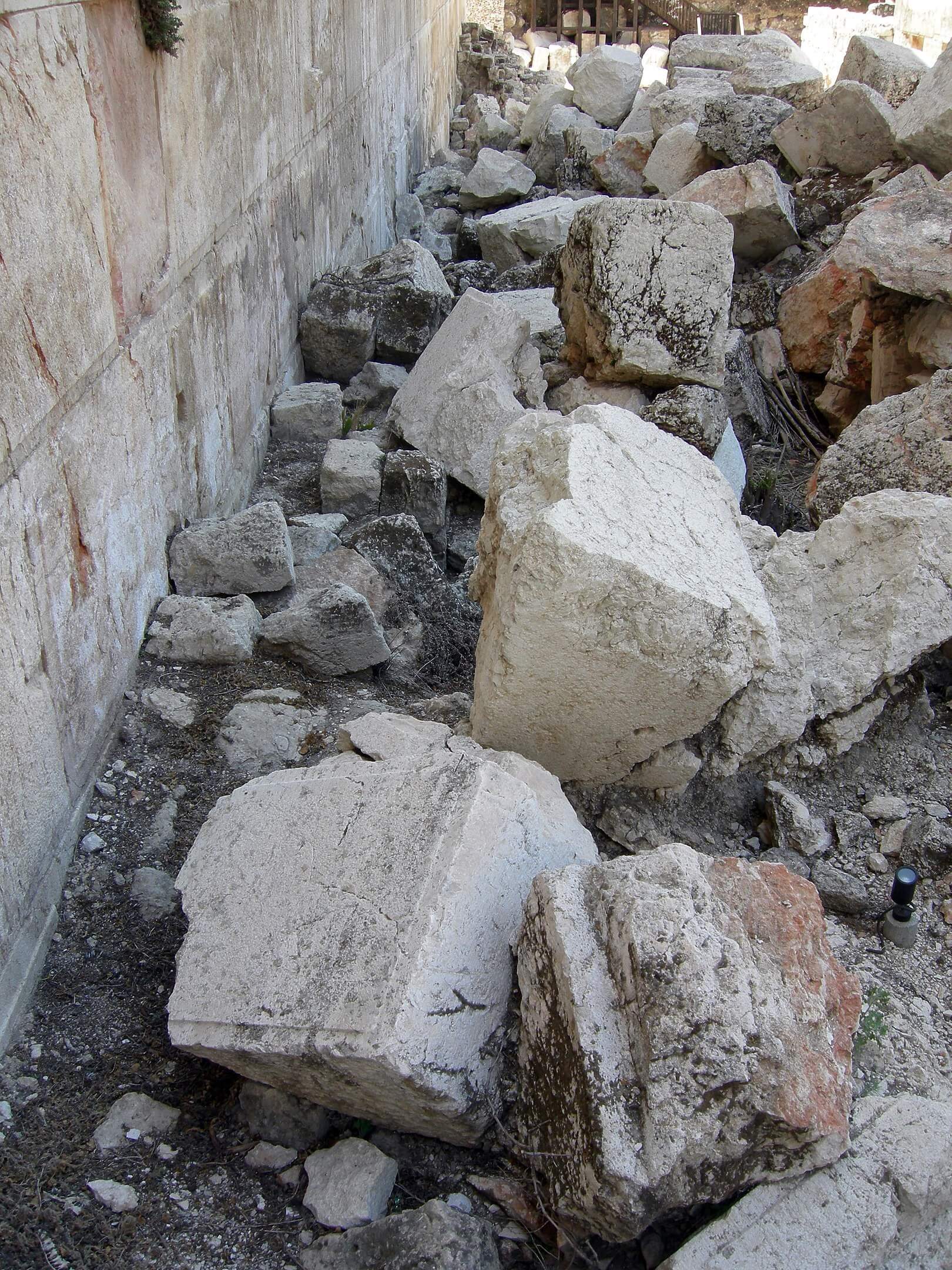 Stones from the Western Wall of the Temple Mount (Jerusalem) thrown onto the street by Roman soldiers in AD70
Stones from the Western Wall of the Temple Mount (Jerusalem) thrown onto the street by Roman soldiers in AD70
In the lifetime of Jesus, His ministry was limited to the land of Judea. Thereafter, the ministry of Matthew was similarly aimed towards Jews. The Gospel according to Matthew begins by carefully detailing Jesus as a descendant of David and Abraham. This is necessary in order for Jesus to be the Messiah spoken of in Jewish prophecy.
Several times in the gospel, Matthew is critical of Jewish Pharisees. But, he is not trying to replace Judaism with a new religion. Instead, he says Jesus is fulfilling Jewish prophecy. He instructs that Jewish scriptures should be more closely adhered to by the followers of Jesus (than they had been by 'hypocritical' Pharisees).
And yet, at the time it was written, a certain separation must have existed between Matthew's followers and many Jews simply because Matthew's followers insisted Jesus was the Messiah. The Gospel ends with the resurrected Jesus instructing “go and make disciples of all the nations". Therefore, Matthew pre-empts the spread of the faith and stands as a bridge between Judaism and the new church. No doubt, this is part of the reason Matthew is the first book of the New Testament instead of the earlier Gospel of Mark.
That the kings come to pay tribute to Jesus in Matthew further fulfils Jewish messianic prophecy. It also positions Jesus as the Son of God for gentiles (non-Jews).
Blagoslov obitelji (family blessing) and the traditions of Epiphany (Bogojavljenje) Three Kings Day in Croatia (Sveta tri kralja)
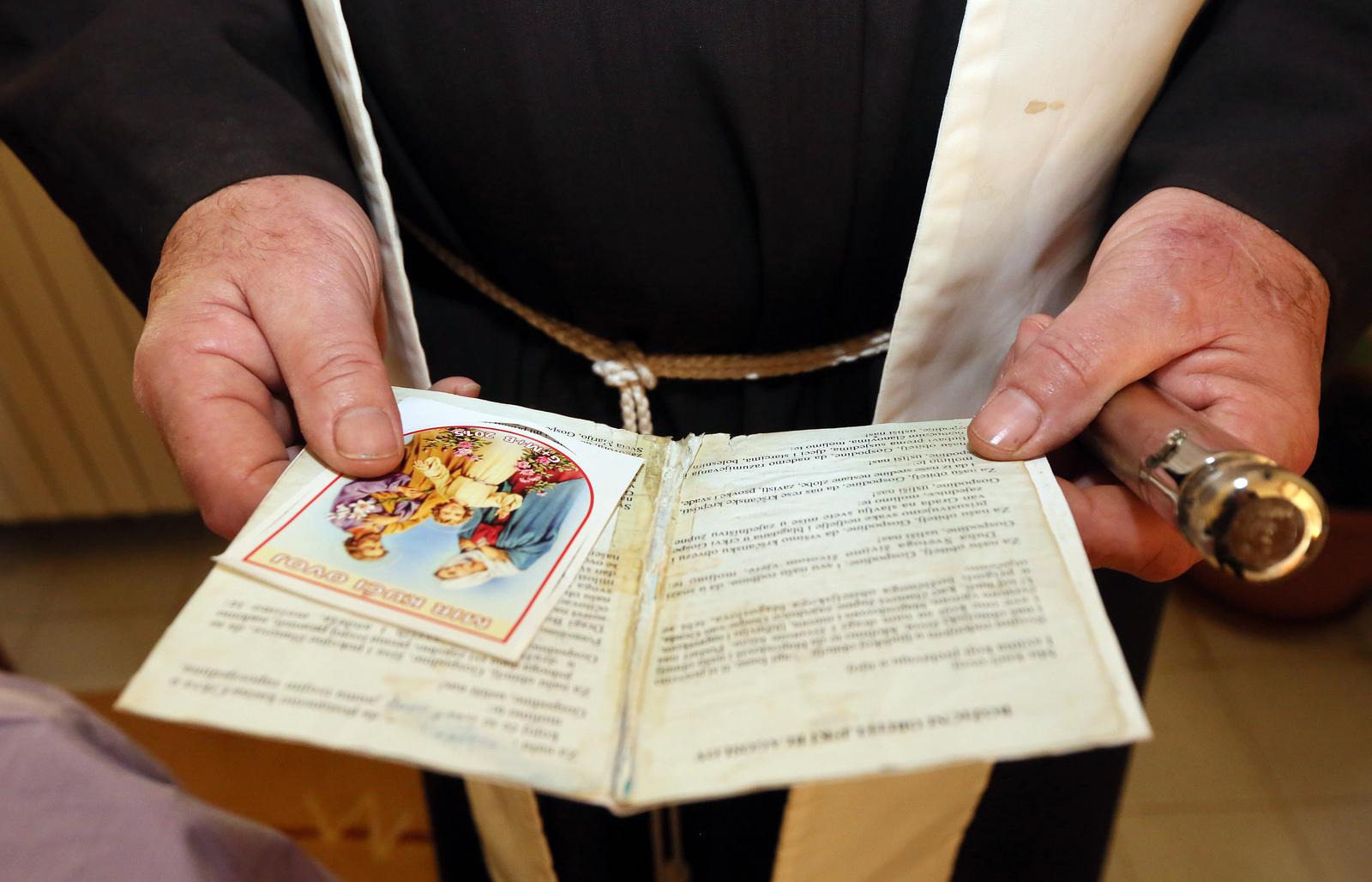 Bogojavljenje aka Three Kings Day in Croatia, by Dusko JaramazPIXSELL
Bogojavljenje aka Three Kings Day in Croatia, by Dusko JaramazPIXSELL
Traditionally, this is the day on which your local priest would visit your home to bless it and the family within. Nowadays, Croatia's population has grown so as to make this impossible. So, in the modern era, the annual blessing of home and family take place between St. Stephen's day (here) and today.
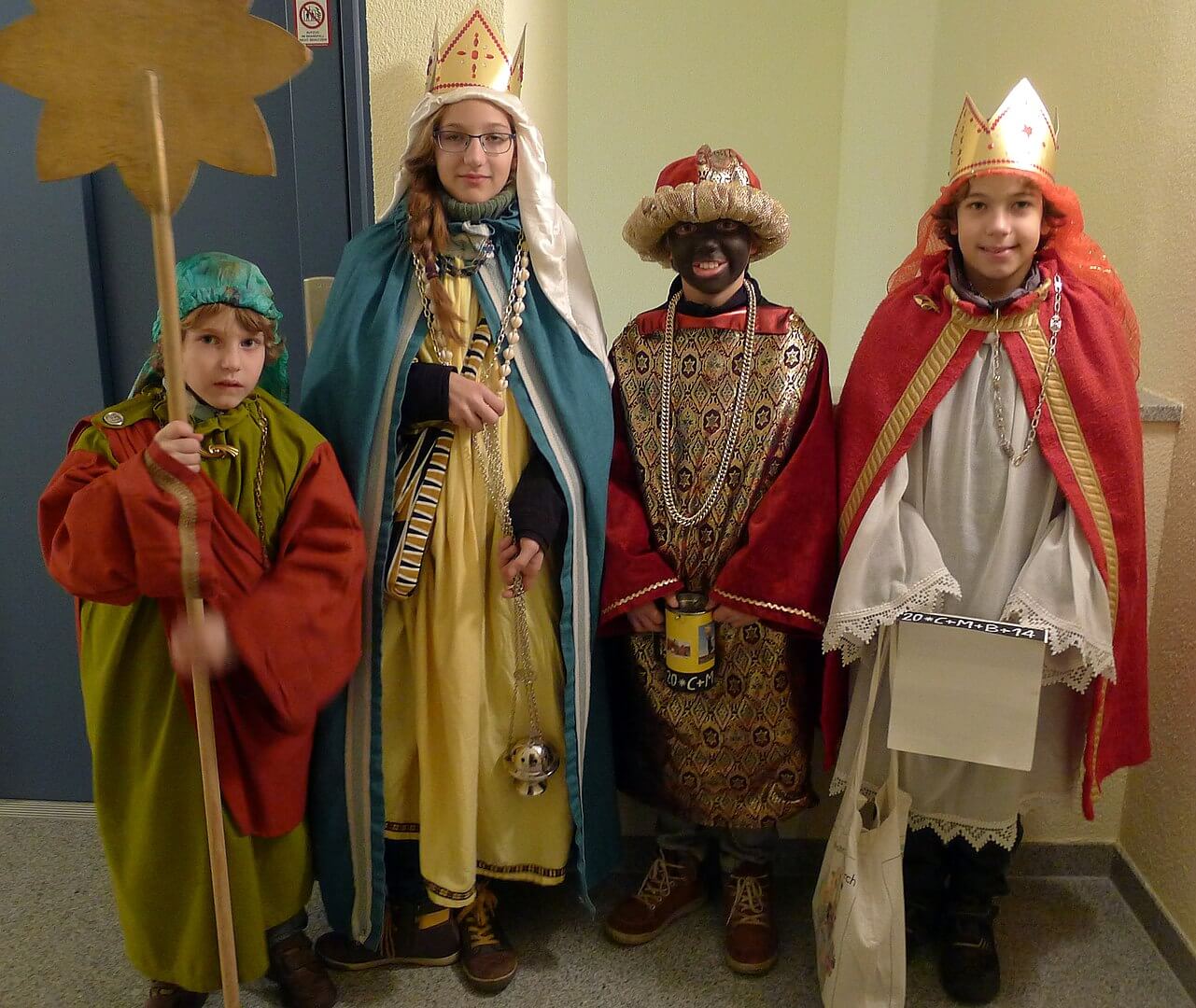 Zvjezdari in Germany, by James Steakley
Zvjezdari in Germany, by James Steakley
This is still a day of Christmas, celebration and decoration. Traditionally, the priest may have been accompanied by altar boys who rang bells to let villagers know they were on their way. These days, the altar boys could be choristers or simply young parishioners. It is not uncommon for them to sing and to be dressed as the Three Kings and carrying a star (Zvjezdari – starmen).
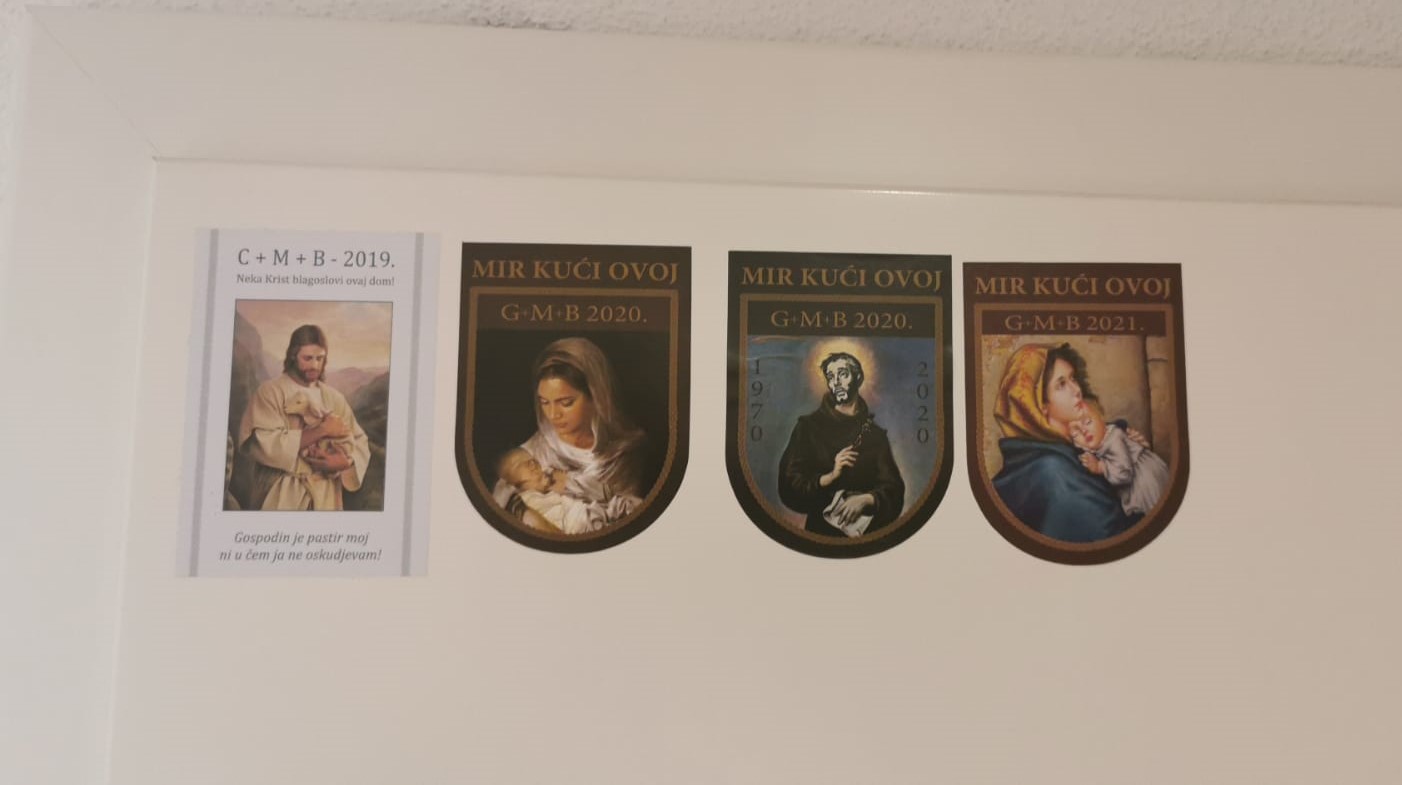 Collection of stickers marking Blagoslov obitelji (family blessing), awarded on Three Kings Day in Croatia. Note the different spelling of Saint Gaspar (Croatian) / Caspar (Latin)
Collection of stickers marking Blagoslov obitelji (family blessing), awarded on Three Kings Day in Croatia. Note the different spelling of Saint Gaspar (Croatian) / Caspar (Latin)
As part of the home blessing, it was traditional for the priest to sprinkle the home with Holy water. Also, he would write in chalk above the main entrance to the home. The chalked pattern would read 20 ✝ C ✝ M ✝ B ✝ 22 - numbers denoting the year, and the cross separating the letters C (G), M and B. These are the initials of the Magi Caspar (Gaspar), Melchior and Balthazar. They are also an abbreviation of the Latin blessing Christus mansionem benedicat - May Christ bless this house. This chalking of the door signals the home has been blessed for the year and echoes the Old Testament marking of doorways by the Israelites in Egypt. As in Matthew, the tradition of Three Kings bridges Judaism and the new church. Nowadays, the chalk writing has in most instances been replaced by stickers.
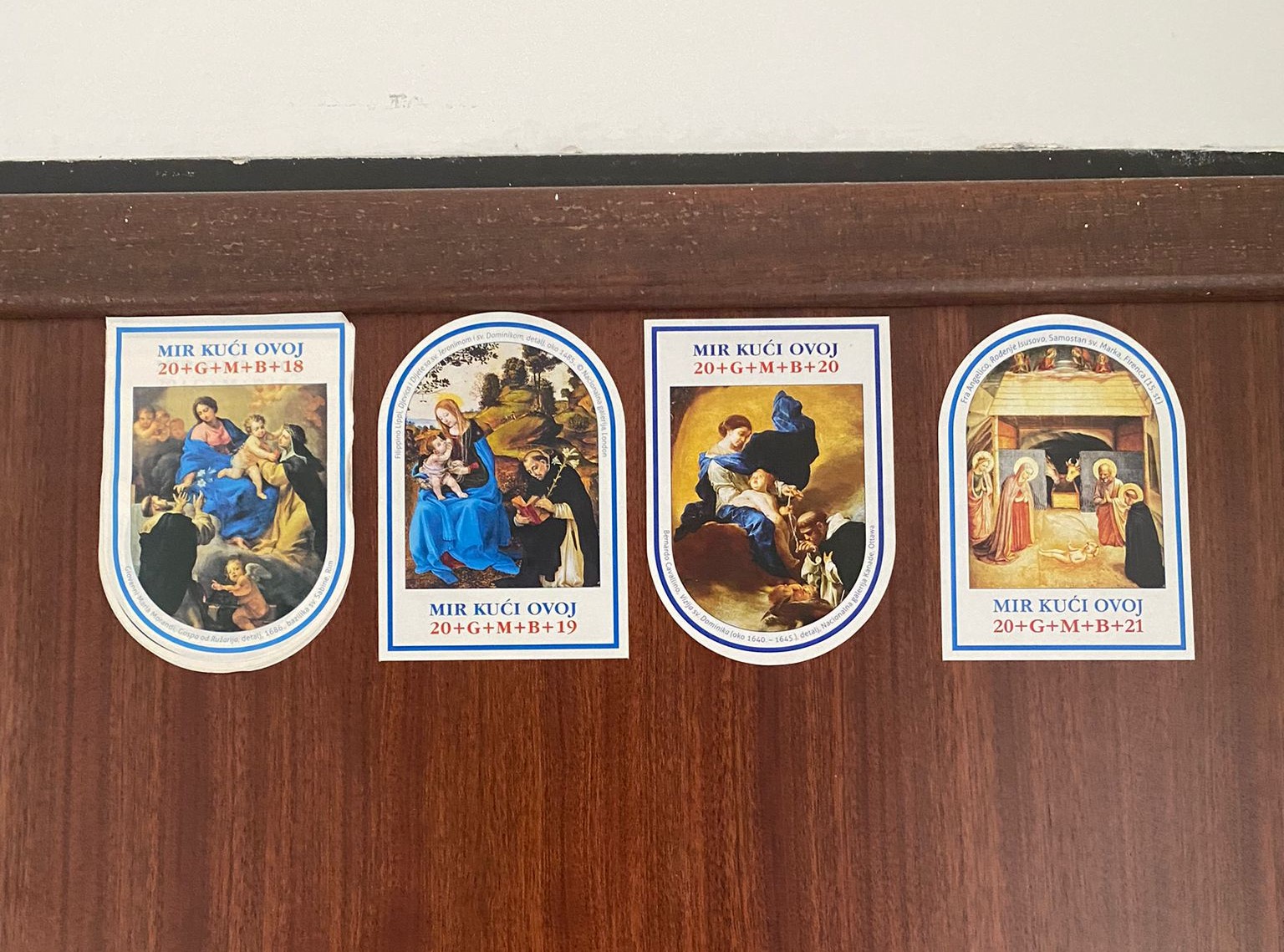 Collection of stickers marking Blagoslov obitelji (family blessing) - these will be added to on Three Kings Day in Croatia
Collection of stickers marking Blagoslov obitelji (family blessing) - these will be added to on Three Kings Day in Croatia
In the distant past of Three Kings visits, a greater significance was put on the blessing of the home and property. But, in order to diminish the supernatural aspect of 'warding off bad spirits from the home', the church has continuously aimed to make the blessing more about the family gathered within. These days, that is reflected in the contemporary wording of the blessing.
This family aspect of the blessing actually goes back an incredibly long way. This time of year is one of the least demanding for those who work in farming or agriculture. It was easier to gather together the full family for the blessing at this time than at almost any other during the year. This tradition still exists – it is customary for the full family to be gathered together when the priest visits.
Another tradition that persists is the cleaning of the home prior to the visit. Although, this is not only because the priest is coming. Remember, Bogojavljenje is Jesus's revelation as the Son of God to all those outside Judea and Judaism – as represented by the Three Kings.
The Three Kings give the gifts of frankincense (signifying his origin from God), gold (signifying his royal status on earth) and myrrh (a balm, signifying that Jesus is a man). The cleaning and blessing of the home welcomes Jesus into Croatian home – as a man he walks among us.
In the modern era, it is customary for the family to give a monetary donation to the priest at the time of the visit. This is not traditional nor is it 'payment' for the blessing or visit. God's blessing cannot be bought or paid for, and is not denied to anyone who asks for it - whether he had money or not. That the traditional annual donation takes place on this visit is a matter of convenience.
Non-Croatian traditions of Epiphany (Bogojavljenje) Three Kings Day in Croatia (Sveta tri kralja)
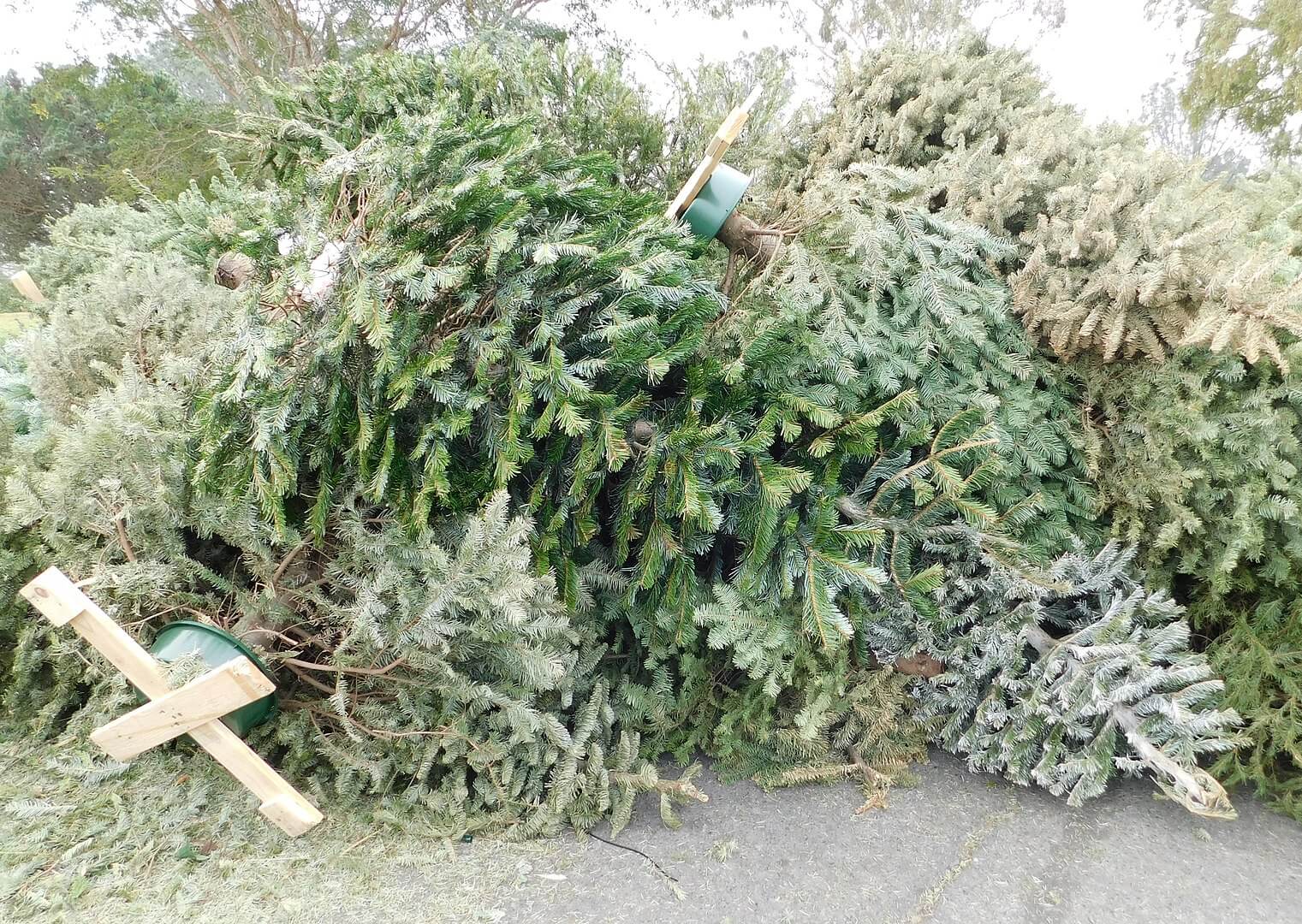 Christmas tree recycling, by Ruff tuff cream puff
Christmas tree recycling, by Ruff tuff cream puff
Bogojavljenje is one of the oldest Christian holidays marked in the Croatian Catholic calendar. The fact the day remains a national holiday in Croatia attests to its continued importance.
The laziest and most incorrect contemporary 'custom' attributed Croatian Bogojavljenje is that it's the day you should throw out your Christmas tree and take down your decorations. Wrong. The second biggest modern error is to regard Bogojavljenje as the end of Christmas.
The Christmas tree is not a traditional part of Croatian Christmas. It is German. Its widespread popularity only really began from around 1850 in the UK (thanks to their German monarchy importing it) and from 1870 in the USA. Only after that did the custom travel internationally. To regard the discarding of Christmas trees as a fundamental part of a centuries-old tradition displays an extremely limited and shallow knowledge of Croatian traditions.
In fact, it is Croatian tradition for the local priest to visit the family with the home still decorated. Typically, the priest was fully embraced into the family Christmas setting when he called – jaslice (nativity), candles, log fire, decorations and all. In the past, the priest was usually offered food and drink from the family. In many instances, they would all enjoy the seasonal food together.
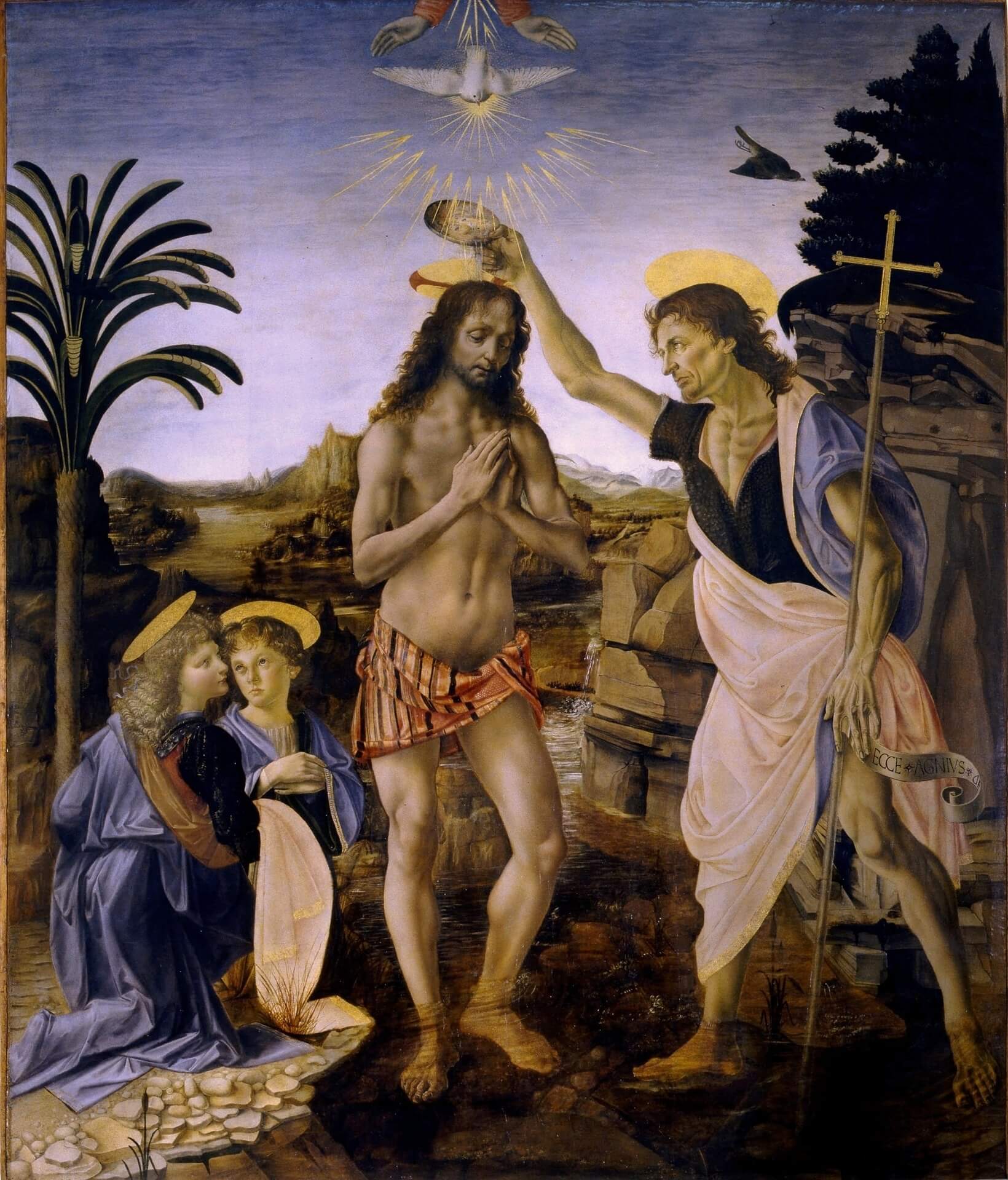 Baptism of Christ, by Leonardo DaVinci
Baptism of Christ, by Leonardo DaVinci
Advent starts on the fourth Sunday before Christmas and ends on Christmas Eve (here). Christmas begins in the evening of Christmas Eve. Like elsewhere, Epiphanytide begins on Three Kings Day in Croatia. But, that does not mark the end of Christmas. In fact for Catholics, Christmas ends officially on the Feast of the Baptism of the Lord, celebrated on the Sunday after Epiphany - Three Kings Day in Croatia (in 2022, Sunday 9 January).
Accordingly, the most traditional of Catholic houses and churches in Croatia can be seen displaying their decorations until then. Three Kings does mark the end of the '12 Days of Christmas', but this is a secular duration of Christmas and has little to do with Croatian tradition.
With grateful thanks to Iris Ćelić, family Kutleša / Marinić, Pater Ivan Dominik Ilicic and Marko Čurković
Workers’ Front Activists Call for Cancellation of Vatican Agreements
ZAGREB, 18 Dec, 2021 - Activists of the Workers' Front party on Saturday addressed reporters outside the Sisak General Hospital, by a newly installed sculpture representing Virgin Mary and Child Jesus, calling for the termination of agreements between Croatia and the Vatican.
The sculpture, installed outside the entrance to the new hospital block in early December, was a gift to the hospital by the Sisak Diocese.
Workers' Front activist David Bilić said the sculpture "is a tasteless expression of the wealth of the Catholic Church outside an earthquake-damaged hospital that has still not been reconstructed."
"The Workers' Front believes too much money is set aside for the Roman Catholic Church in Croatia, as a result of the Vatican agreements, signed on this day 25 years ago," Bilić said, adding that the party believed the Vatican agreements should be cancelled.
He said that the situation in society had changed due to the economic crisis that was even more felt in the earthquake-struck Sisak-Moslavina County.
The coronavirus pandemic is making the situation worse, not to speak of earthquake damage, while work on removing it is not starting, he said.
"Some will say that the Catholic Church justifies the donations through its charity work," Bilić said, noting that 11% of that money is used for charity work.
"The rest is used for other needs of the Church, which can secure quite a sufficient amount of money for its financing from alms and Vatican sources," Bilić said, with RF activists calling for the reconstruction of the earthquake-hit county to begin as soon as possible.
For more on lifestyle, follow TCN's dedicated page.
For more about Croatia, CLICK HERE.
Msgr. Aldo Cavalli New Apostolic Visitator for Parish of Međugorje
ZAGREB, 27 Nov, 2021 - Pope Francis has appointed Archbishop Aldo Cavalli as special apostolic visitator for the parish of Međugorje, the Holy See's press office and the website of the globally popular Catholic place of pilgrimage in Bosnia and Herzegovina said on Saturday.
Msgr. Cavalli was until now apostolic nuncio in the Netherlands.
The Holy See said in its brief statement that Cavalli has been appointed indefinitely.
Cavalli will continue the mission of Archbishop Henryk Hoser, who died of COVID-19 in Warsaw on 13 August.
Hoser was appointed apostolic visitator for Međugorje in 2018 to organise pilgrimages and pastoral care.
Msgr. Cavalli was born in 1946 in Lecce, Italy, and was ordained a priest in the Bergamo Diocese in 1971.
He served in several nunciatures as secretary and at the Holy See Secretariat of State.
He was apostolic nuncio in Chile, Colombia, Malta and Libya, and since 21 March 2015 he was apostolic nuncio to the Netherlands and the Holy See's permanent representative at the Organisation for the Prohibition of Chemical Weapons (OPCW).
The head of the Franciscan province of Herzegovina, Friar Miljenko Šteko, has welcomed the appointment of the new apostolic visitator.
The Holy See appointed the apostolic visitator for Međugorje in 2018.
The Međugorje phenomenon dates back to 1981 when six local children claimed that the Virgin Mary revealed herself to them. Some of them say that she still does.
For more about Croatia, CLICK HERE.
Plenković: More Than 2 Million Citizens Have Been Vaccinated
ZAGREB, 13 Nov, 2021 - Prime Minister Andrej Plenković on Saturday repeated his appeal to all citizens to get vaccinated and called on those who refused to do so to get tested.
Speaking at a press conference, Plenković said that the number of people vaccinated so far has exceeded 2 million and that today the proportion of people who have received the first dose will most likely reach 60 per cent of the adult population and 50 per cent of the total population.
"Everyone has the right to protest, but what we are advocating is common sense, notably the view of medical professionals, doctors and scientists," the prime minister said. He added that people who do not want to get vaccinated can get tested very quickly and obtain a COVID certificate.
"We respect the people who are responsible and who have been vaccinated. And those who have not, we appeal to them to get vaccinated and to get tested," he said.
Plenković said that the Fitch Ratings agency had taken into account the vaccination rate when it upgraded Croatia's credit rating on Friday. "Ratings agencies watch what we do as a society, whether we stand in solidarity with one another, whether we are responsible, whether we understand what's going on."
Commenting on the message from Croatian Roman Catholic bishops that citizens should not be coerced into getting vaccinated, Plenković said that the bishops should be asked whether they should have publicly called on people to get vaccinated.
He said that Pope Francis was clear in his statement when he appealed to people to get vaccinated.
"I believe that many of our bishops have been vaccinated, considering their age and the availability of the vaccines. As for freedom, it cannot be the reason not to respect the people who have been vaccinated," the prime minister said.
Asked whether he would meet with protesters against COVID certificates, he said he did not get the impression any of them wanted to talk with the government, and that peaceful protests were held to express an opinion.
"We live in a democracy. If anyone wants to talk, they can contact us and say what the problem is. I would like to see what it is about through dialogue," the prime minister said.
Peaceful protests against the introduction of mandatory COVID certificates for public-sector workers and people visiting state and public institutions, were held in several cities across the country on Friday evening. In Zagreb, protesters rallied outside the government building in St Mark's Square.
Commenting on the criticism from President Zoran Milanović regarding the transport of bishops by a Croatian Navy vessel, Plenković said he could not see the problem.
"This was about the ordainment of Bishop Vidović (on Hvar island). The Military Ordinariate had asked the defence minister in writing to arrange transport and the minister approved it. Is it a crime? It's not. Did the state collapse? It didn't," he said.
For more about Croatia, CLICK HERE.
Archbishop of Zagreb Says Song of Mary Applies to All
ZAGREB, 15 Aug, 2021 - The Archbishop of Zagreb, Cardinal Josip Bozanić, said on Sunday the task stemming from the Magnificat, the Song of Mary, applied to every individual and the entire people, "starting from those who carry responsibility in the Church, political and social areas."
Speaking at the central Mass on the occasion of the Assumption in the Marija Bistrica Marian shrine, he said, among other things, that the ongoing pandemic showed that strong civil friendship and unity were necessary and that people were responsible for one another.
"That's why today we pray for all those ill with coronavirus as well as those caring for them, notably the medical staff."
The cardinal also said the Feast of the Assumption led to a better understanding that every conception and birth of a human being was a gift to the mother, the family and the community.
Among those attending the service were Veterans Minister Tomo Medved and Physical Planning, Construction and State Assets Minister Darko Horvat.
Today is also the 50th anniversary of the declaration of Marija Bistrica as the Croatian National Marian Shrine.
For more on lifestyle, follow TCN's dedicated page.
For more about Croatia, CLICK HERE.
Split-Dalmatia County Prefect Possibly Associated with Horror Movie Set Fire
May 6, 2021 – The Split-Dalmatia County Prefect was recently observed delivering an unusual anecdote in which he boasts defending the feelings of the religious by helping to stop a horror film from being shot.
The bizarre video clip shows Split-Dalmatia County Prefect Blazenko Boban bragging to the Minister of Tourism about helping to thwart the filming of a horror movie Omen 666 back in 2005. He thought was telling a funny anecdote while touring the Roman ruins of Salona. But he may have said too much.
Horror movies and religious feelings
Solin and Split were some of the filming locations for a remake of the horror classic - Omen. By December of 2005, the production attained all the necessary permits by the Ministry of Culture to shoot in historical locations of Salona and Split. However, after the details of the movie became known, the local Catholic Church officials became raising their voices against the film. Omen 666 is a story of the Antichrist being born and adopted by an unsuspecting family. It relies heavily on biblical themes. According to Boban himself, the scene with the Antichrist rising up from a grave in Salona caused the most controversy. The Split-Makarska Arch-bishop’s Office made an official appeal to have the filming permit withdrawn. Boban began pressuring the Minister of Culture about it, but with no luck. Eventually, he organised a few people “to stage” a fire on the set. When the news of the fire reached the Minister, he revoked the filming permits. The production left Salona and Croatia.
In the movie clip where County Prefect Boban is seen telling the story, as published by Slobodna Dalmacija, the face masks are not enough to hide nervous smiles on everyone’s faces. Even though he told the story jokingly, the fact remains there actually was a fire. Not only that, but the movie director John Moore has since stated in an interview with Irish Times how the set had been vandalised and burned down. A subsequent move to a different filming location supposedly cost the film company around half a million US dollars.
Will there be a sequel?
It is incredible that such a story would come out to the public the way it did. In his careless attempt at comedy, County Prefect Boban might have bitten off more than he could chew. This story first came out almost a week ago and it was fairly quickly put to rest. The original police report was for a crime of “destroying and damaging private property”. There is an expiry deadline for this type of crime in Croatia during which it needs to get to court. This deadline has passed. However, Telegram.hr reports State Attorney’s Office in Split is still looking into the case in light of new information. Because of the amount of incurred damages and the description of the event, it is apparently still possible to change the charge into a more serious one with a longer expiry deadline. While unlikely, if this case does ever get to court, it will be one of the more unusual stories from the wild world of Croatian politics.
For more about politics in Croatia, follow TCN's dedicated page.
Rijeka Pastor: Bless Your Own Houses, Just Send The Money
December the 6th, 2020 - The ongoing coronavirus crisis has made just about everything ten times more difficult than it should be. While the horrific stories from hospitals circulate and the worrisome financial issues being faced by companies only add to what is a very bitter tasting broth, one Rijeka pastor has thought up a plan of sorts.
Many Croatian companies have rather successfully managed to turn to online sales in order to make ends meet as facilities close down, but could we have ever imagined that the church might do the same? This Rijeka pastor has let everyone who might need to know that although he can't come and bless anyone's home personally because of the risk of contagion, they're free to ''do the blessing'' themselves, as long as they send their payments.
As Index writes, due to the coronavirus epidemic, the Catholic Church in Croatia, more precisely its parishes throughout Croatia, could lose significant funds they regularly receive from the blessing of houses.
As such, one Rijeka pastor with a clearly keen entrepreneurial eye sent a letter out to the faithful, inviting them to bless their own homes, while the money that is donated to the Church during the blessing of the house can be paid by the faithful into a bank account. This was stated in a letter sent by a Rijeka priest from Skurinje, Novi list writes.
"I hope you're well. We're living in uncertain and difficult times, times that aren't easy at all, so, we really need God's blessing to protect us from the coronavirus pandemic now. Unfortunately, due to the epidemiological situation, this year I decided not to to visit families to provide that blessing, so that I wouldn't end up being a potential carrier of the coronavirus infection and disease. I want to protect both you and myself,'' writes the Rijeka pastor from Skurinje.
Furthermore, the letter lists the work that the parish from Skurinje has completed and all that it continues to plan to do.
"It's customary for families to give the priest their annual financial contribution for the needs of the parish during the blessing of the family. If you feel that need and if you want to donate your contribution to the parish this year, you can do so by bringing it to the parish office, sacristy or by sending it to the parish's bank account,'' writes the Rijeka pastor from Skurinje, thanking (from the bottom of his heart) those who choose to do so for their generosity.
"Prepare some holy water, a Bible, a cross and a candle on the table for the blessing of the family. If you don't have holy water in your families, you can come to church with a bottle and take some," the Rijeka pastor said before congratulating all believers on the upcoming Christmas period.
For the latest travel info, bookmark our main travel info article, which is updated daily.
Read the Croatian Travel Update in your language - now available in 24 languages


